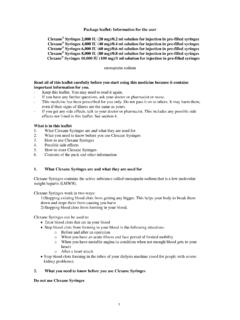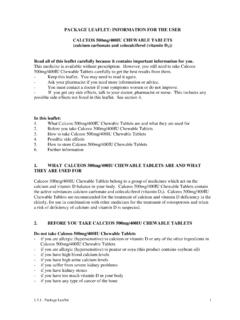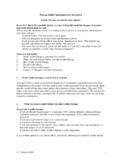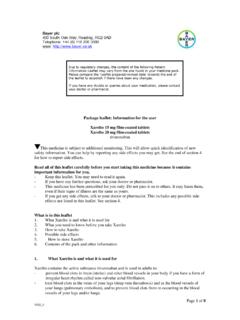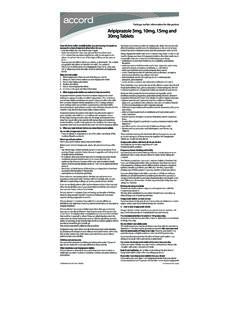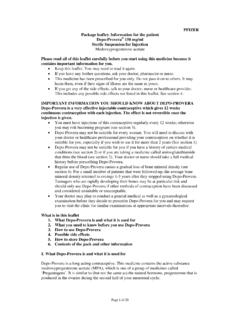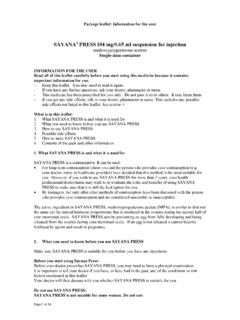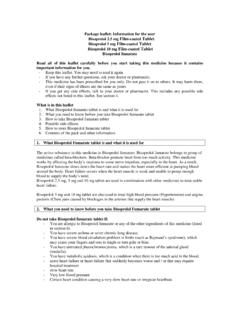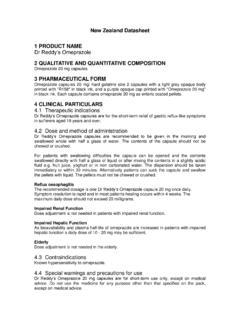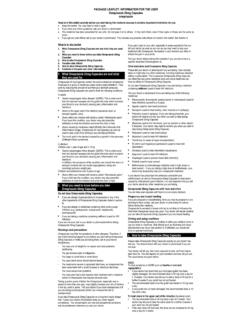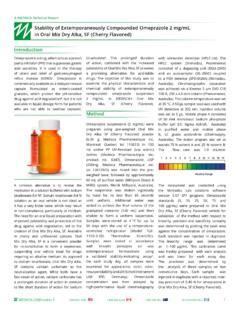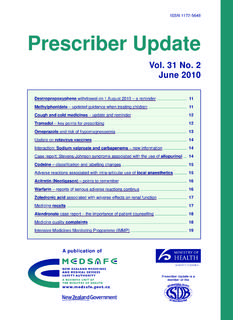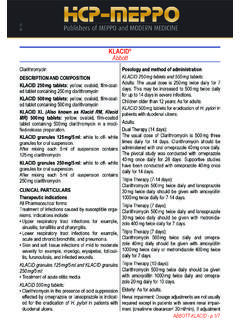Transcription of PACKAGE LEAFLET - Medicines
1 PACKAGE LEAFLET PACKAGE LEAFLET : INFORMATION FOR THE USER omeprazole 10, 20 & 40 mg Gastro-resistant Capsules ( omeprazole ) Read all of this LEAFLET carefully before you start taking this medicine because it contains important information for you. Keep this LEAFLET . You may need to read it again. If you have any further questions, ask your doctor or pharmacist. This medicine has been prescribed for you. Do not pass it on to others. It may harm them, even if their signs of illness are the same as yours. If you get any side effects, talk to your doctor or pharmacist or nurse. This includes any possible side effects not listed in this LEAFLET . See section 4. What is in this LEAFLET : 1. What omeprazole is and what it is used for. 2. What you need to know before you take omeprazole . 3. How to take omeprazole . 4. Possible side effects. 5. How to store omeprazole . 6. Contents of the pack and other information.
2 1. WHAT omeprazole IS AND WHAT IT IS USED FOR omeprazole belongs to a group of Medicines called proton pump inhibitors . They work by reducing the amount of acid that your stomach produces. omeprazole is used to treat the following conditions: In adults: Gastro-esophageal reflux disease (GERD). This is where acid from the stomach escapes into the gullet (the tube which connects your throat to your stomach) causing pain, inflammation and heartburn. Ulcers in the upper part of the intestines (duodenal ulcer) or stomach (gastric ulcer). To stop ulcers in the upper part of the intestines (duodenal ulcer) or stomach (gastric ulcer) from coming back. Ulcers which are also infected with a bacteria called Helicobacter pylori . If you have this condition, your doctor may also prescribe antibiotics to treat the infection and allow the ulcer to heal. Ulcers caused by Medicines called NSAIDs (non-steroidal anti inflammatory drugs).
3 omeprazole can also be used to stop ulcers from forming if you are taking NSAIDs. Too much acid in the stomach caused by a growth in the pancreas (Zollinger-Ellison syndrome). In children: Children over 1 year of age and 10kg: Gastro-esophageal reflux disease (GERD). This is where acid from the stomach escapes into the gullet (the tube which connects your throat to your stomach) causing pain, inflammation and heartburn. In children the symptoms of the condition can include the return of stomach contents into the mouth (regurgitation), being sick (vomiting) and poor weight gain. Children and adolescents over 4 years of age: Ulcers which are infected with bacteria called Helicobacter pylori . If your child has this condition, your doctor may also prescribe antibiotics to treat the infection and allow the ulcer to heal. 2. WHAT YOU NEED TO KNOW BEFORE YOU TAKE omeprazole Do not take omeprazole if you: are allergic to omeprazole or any of the other ingredients of this medicine (listed in Section 6).
4 Are allergic to Medicines containing other proton pump inhibitors ( pantoprazole, lansoprazole, rabeprazole, esomeprazole). are taking a medicine containing nelfinavir (used for HIV infection). If you are not sure, talk to your doctor or pharmacist before taking omeprazole . Warnings and Precautions omeprazole may hide the symptoms of other diseases. Therefore, if any of the following happen to you before you start taking omeprazole , or whilst you are taking it, talk to your doctor or pharmacist: You lose a lot of weight for no reason and have problems swallowing. You get stomach pain or indigestion. You begin to vomit food or blood. You pass black stools (blood-stained faeces). You experience severe or persistent diarrhoea, as omeprazole has been associated with a small increase in infectious diarrhoea. You have severe liver problems. You have ever had a skin reaction after treatment with a medicine similar to omeprazole that reduces stomach acid.
5 You are due to have a specific blood test (Chromogranin A). If you take omeprazole on a long-term basis (longer than 1 year) your doctor will probably keep you under regular surveillance. You should report any new and exceptional symptoms and circumstances whenever you see your doctor. Taking a proton pump inhibitor like omeprazole , especially over a period of more than one year, may slightly increase your risk of fracture in the hip, wrist or spine. Tell your doctor if you have osteoporosis or if you are taking corticosteroids (which can increase the risk of osteoporosis). If you get a rash on your skin, especially in areas exposed to the sun tell your doctor as soon as you can, as you may need to stop your treatment with omeprazole . Remember to also mention any other ill-effects like pain in your joints. Other Medicines and omeprazole Tell your doctor or pharmacist if you are taking or have recently taken or might take any other Medicines , including Medicines obtained without a prescription.
6 This is because omeprazole can affect the way some Medicines work and some Medicines can have an effect on omeprazole . Do not take omeprazole if you are taking a medicine containing nelfinavir (used to treat HIV infection). Tell your doctor or pharmacist if you are taking, have recently taken, or might take any of the following Medicines : Ketoconazole, itraconazole, posaconazole or voriconazole (used to treat infections caused by a fungus). Digoxin (used to treat heart problems). Diazepam (used to treat anxiety, relax muscles or in epilepsy). Phenytoin (used in epilepsy). If you are taking phenytoin, your doctor will need to monitor you when you start or stop taking omeprazole . Medicines that are used to thin your blood, such as warfarin or other vitamin K blockers. Your doctor may need to monitor you when you start or stop taking omeprazole . Rifampacin (used to treat tuberculosis). Atazanavir (used to treat HIV infections).
7 Tacrolimus (in cases of organ transplantation). St John s Wort (Hypericum perforatum) (used to treat mild depression). Cilostazol (used to treat intermittent claudication). Saquinavir (to treat HIV infections). Clopidogrel (used to prevent blood clots (thrombi)). Erlotinib (used to treat different types of cancer). Methotrexate (a chemotherapy medicine used in high doses to treat cancer) if you are taking a high dose of methotrexate, your doctor may temporarily stop your omeprazole treatment. If your doctor has prescribed the antibiotics amoxicillin and clarithromycin as well as omeprazole to treat ulcers caused by Helicobacter pylori infection, it is very important that you tell your doctor about any other Medicines you are taking. Tell your doctor or the medical staff if you undergo a test for tumours. omeprazole with food and drink You can take your capsules with food or on an empty stomach.
8 Pregnancy and breast-feeding If you are pregnant or breast-feeding, think you may be pregnant or are planning to have a baby, ask your doctor or pharmacist for advice before taking this medicine. Your doctor will decide whether you can take omeprazole if you are breast-feeding. Driving and using machines omeprazole is not likely to affect your ability to drive or use any tools or machines. Side effects such as dizziness and visual disturbances may occur (see section 4). If affected, you should not drive or operate machinery. Important information about some of the ingredients of omeprazole omeprazole 40 mg contains Sunset Yellow (E110) and Allura red (E129). May cause allergic reactions. This medicine contains sucrose. If you have been told by your doctor that you have an intolerance to some sugars, contact your doctor before taking this medicinal product. 3. HOW TO TAKE omeprazole Always take omeprazole exactly as your doctor or pharmacist has told you.
9 You should check with your doctor or pharmacist if you are not sure. Your doctor will tell you how many capsules to take and how long to take them for. This will depend on your condition and how old you are. Adults: To treat symptoms of GERD such as heartburn and acid regurgitation: If your doctor has found that your food pipe (gullet) has been slightly damaged, the recommended dose is 20 mg once a day for 4-8 weeks. Your doctor may tell you to take a dose of 40 mg for a further 8 weeks if your gullet has not yet healed. The recommended dose once your gullet has healed is 10 mg once a day. If your gullet has not been damaged, the recommended dose is 10 mg once a day. To treat ulcers in the upper part of the intestine (duodenal ulcer): The recommended dose is 20 mg once a day for 2 weeks. Your doctor may tell you to take the same dose for a further 2 weeks if your ulcer has not yet healed. If the ulcer does not fully heal, the dose can be increased to 40 mg once a day for 4 weeks.
10 To treat ulcers in the stomach (gastric ulcer): The recommended dose is 20 mg once a day for 4 weeks. Your doctor may tell you to take the same dose for a further 4 weeks if your ulcer has not yet healed. If the ulcers do not fully heal, the dose can be increased to 40 mg once a day for 8 weeks. To prevent duodenal and stomach ulcers from coming back: The recommended dose is 10 mg or 20 mg once a day. Your doctor may increase the dose to 40 mg once a day. To treat duodenal and stomach ulcers caused by NSAIDs (non-steroidal anti inflammatory drugs): The recommended dose is 20 mg once a day for 4 to 8 weeks. To prevent duodenal and stomach ulcers if you are taking NSAIDs: The recommended dose is 20 mg once a day. To treat ulcers caused by Helicobacter pylori infection and to stop them coming back: The recommended dose is 20 mg omeprazole twice a day for one week. Your doctor will also tell you to take two antibiotics among amoxicillin, clarithromycin and metronidazole.
